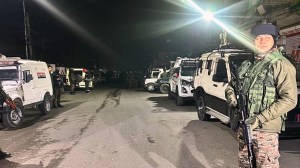Panel as panacea
So the good minister has spoken. The children of this country will soon be blessed with a spanking new commission all for themselves. It w...

So the good minister has spoken. The children of this country will soon be blessed with a spanking new commission all for themselves. It will, no doubt, serve as a palpable demonstration to the world that India cares for its progeny, even if about half of them remain chronically malnourished. Just as the National Commission of Women, with no teeth to call its own, can only express despair over the ever burgeoning number of crimes against women, are we now to have another bureaucratic edifice spouting reports and figures on the plight of children and doing very little about it? If this is all that the proposal boils down to, it would be far better to shelve it here and now, before it assumes a life of its own, consuming effort, money and mandays.
If, however, the department of women and child — please note, it has not even been given the status of a ministry as yet — is serious about a commission for children, then the first thing it will have to ensure is that such an institution is taken seriously. This will not happen unless its recommendations are made binding and it has the powers to summon people/access documents. Anything less than this would make it a great break for bureaucrats but not for the children it seeks to serve. However, a commission for children, with the requisite powers, can and will work wonders, seeing that there is so much to do. One of the great lacuna that has characterised child welfare administration in India has been its extremely disjointed nature, with duplication and duplicity being the order of the day. For instance, take that wonderful document that goes by the nomenclature National Policy on Child Labour 1987′. In it is envisaged stringent and rigorous enforcement of the relevant laws preventing and regulatingchild labour. It also seeks to help the parents of working children and adopt a “project approach to rehabilitation”. Nothing of this has, of course, happened, with the government not even being able to keep child labour out of hazardous industries.
A commission of the kind proposed must, ideally, adopt a three-pronged approach to child welfare through development strategies, preventive strategies and long-term strategies. In the first category would fall that most important initiative of all — ensuring that every child gets eight years of basic schooling, something that has been long regarded as a fundamental right. Tackling micronutrient deficiencies is an issue that concerns generations to come and therefore needs special emphasis, even if it is within the existing ICDS format. Within the second category would fall all child victims of abuse and neglect, including children who’ve been subjected to physical and emotional violence, sexual abuse and trafficking. Providing a safety net to those who are already in the category, or are in danger of falling into the abyss, would then necessarily occupy the attentions of the commission. Street children, ubiquitous in cities everywhere in the country, indicate the enormity of the task at hand. If all this hasto be sustainable in any meaningful way, long-term strategising becomes crucial. Any commission that attempts this spectrum of initiatives in a holistic, rational and self-perpetuating manner would indeed be welcome.


- 01
- 02
- 03
- 04
- 05





























